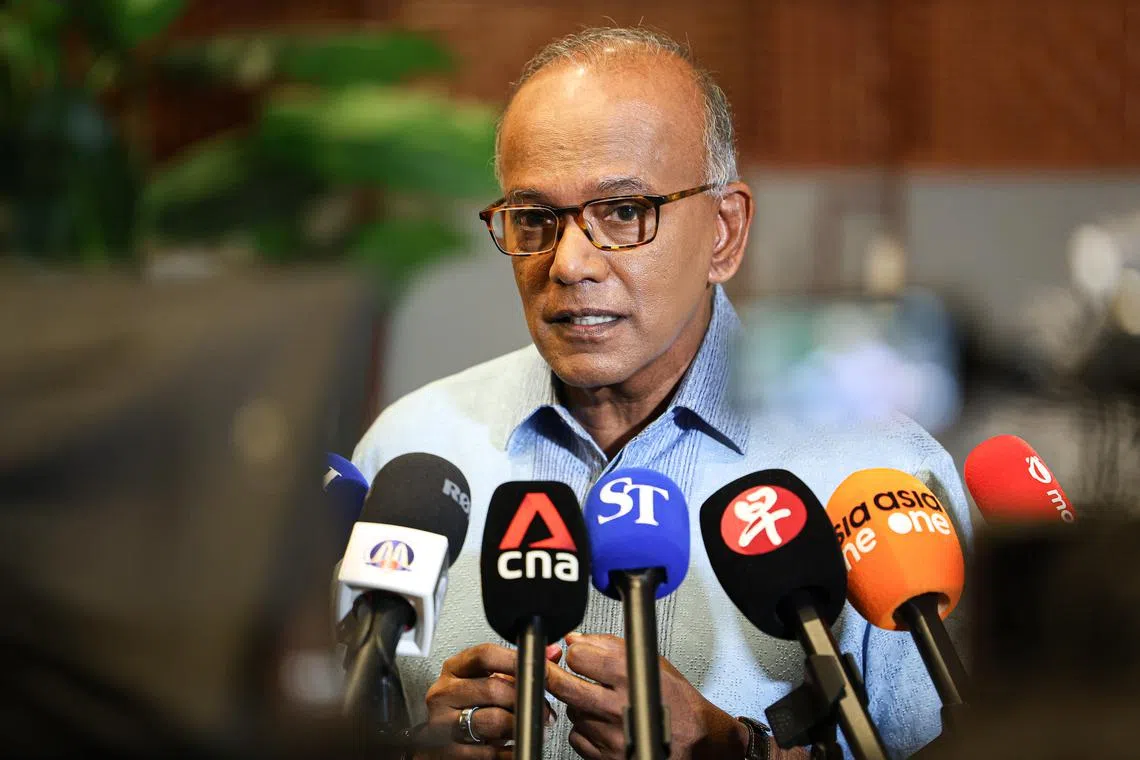Charlie Kirk shooting highlights need for law and order in democratic discourse: Shanmugam
Sign up now: Get ST's newsletters delivered to your inbox

Singapore’s Home Affairs Minister K. Shanmugam speaking to the media on Sept 12 at Laguna National Golf Resort Club.
PHOTO: LIANHE ZAOBAO
Follow topic:
SINGAPORE – Assassinated political activist Charlie Kirk was a victim of worsening political divisions within the United States, said Home Affairs Minister K. Shanmugam, stressing the need for law and order to have proper democratic discourse.
For such discourse to happen, there must be low crime and trust in institutions, and people must feel safe, said Mr Shanmugam, who is also the Coordinating Minister for National Security.
He was speaking to the media on Sept 12 at the Laguna National Golf Resort Club before attending a charity dinner held by Thye Hua Kwan Moral Charities, following the fatal shooting of Mr Kirk .
Mr Kirk, an American conservative activist credited with pulling in the youth vote for US President Donald Trump in the 2024 election, was shot dead on Sept 10 as he was speaking to students and visitors at Utah Valley University.
Singapore’s approach is zero tolerance for gun violence, drug trafficking, hate speech and inciting violence, as well as being tough on crime and its causes, said Mr Shanmugam.
“And our politics is largely operated within the framework where we discuss our differences in a mostly civilised way,” he added.
Mr Shanmugam said what happened to Mr Kirk was horrific, but not surprising as political divisions within the US have been getting worse for some time.
“Very harsh, toxic language used against political opponents, persons with opposing views,” he added, noting that they are essentially labelled as enemies.
There is also a “winner-takes-all mentality without compromises”, a general worsening of public life and easy availability of high-grade weapons, he said, listing factors that have led to the killings of high-profile political activists.
He noted that there has been violence against both Democrats and Republicans.
Mr Shanmugam said a key purpose of democracy is to deal with differences that people have in how they think society should be structured in the available forums.
In Singapore, people can have their opinions and viewpoints, which the Government tries to manage in a civilised way, he said.
“We have various forums for these sorts of discussions, and ultimately, Parliament is the highest forum where you can discuss and debate. And then eventually we try and reach a compromise,” he said.
There cannot be a situation where the “winner takes all”, and there must be a compromise within different sections of society, Mr Shanmugam said. “Everybody has got to feel that they have a stake and they have to trust the institutions.”
While Singapore is in a “much calmer situation”, there are “some worrying signs”, he added when asked if the Republic’s political discourse could go down the same path as the US’.
One worrying trend is that some politicians here are “playing identity politics” based on race and religion, said Mr Shanmugam, without naming the politicians.
He said: “In every country there is profit, political profit in doing that. If we go down that route, well, ultimately Singapore will suffer.”
Mr Shanmugam declined to elaborate on these trends when asked.
He added that Singapore has so far largely kept away from identity politics, despite the multiplicity of races and religions in the country.
This is one key difference that has worked well for Singapore, he said, adding that he hopes Singaporeans will continue to eschew such politics.
The Republic is, so far, a high-trust society, he noted.
But the country is different because of its strict law and order regime, not because Singaporeans are inherently different from Americans or others, Mr Shanmugam said, adding that Mr Kirk’s assassination was despicable, regardless of whether one agreed or disagreed with him.
“It’s different because of our laws and our social policies, and the fact that we have been able to explain that and get the buy-in from our population.”
But laws do not make people automatically like one another, Mr Shanmugam said.
“You still need policies that bring our population together,” he said, adding that organisations like the People’s Association actively work to unite Singaporeans.
“Our population is integrated. They come together. We celebrate each other’s festivals. So those are all part of social policies, but we also have the laws. That’s what makes Singapore different, not because we are inherently different or superior beings.”


